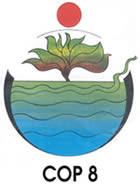 |
|
|
||||||||||
|
|
|||||||||
| Opening Plenary: | |
 |
Left photo L-R: Mohamed Elyazghi, Minister of Environment (Morocco) and Joke Waller-Hunter, UNFCCC Executive Secretary |
Right photo L-R: Mohamed Elyazghi, Morocco's Minister of Environment lighting the lamp. |

|
 COP-7 President Mohamed Elyazghi (Morocco) declared COP-8 open, and thanked India for hosting the conference. Noting that COP-7 took place following the events of 11 September, 2001, he stressed the importance of multilateralism. He drew attention to the Marrakesh Accords, and to the many ratifications of the Kyoto Protocol, stressing that the process now will move from drafting to implementation. |
|
 COP-8 President Baalu welcomed participants, and said lighting the lamp signifies the advancement of understanding and removal of ignorance. Noting that impacts of climate change already are being felt, he stressed impacts on the most vulnerable groups. |
|
 Executive Secretary of the UNFCCC Joke Waller-Hunter (center) stressed the linkage between poverty and environment made at the WSSD, and explained that the Secretariat would facilitate information exchange between Parties implementing the UNFCCC and Protocol by hosting authoritative databases of emissions, and of policies and measures (P&Ms). |
|
| Organizational Matter: | |
|
|
|
 CANADA emphasized the cleaner energy proposal as a priority for the future success of the Protocol. |
|
| The G-77/CHINA, expressed disappointment in the financial resources that have been provided by Annex I Parties, stressing that any action taken so far has only been symbolic. |
|
| CHINA stressed eradication of poverty, and said the climate regime should take into account that improved quality of life in developing countries means energy demands will increase, stressing the principle of common but differentiated responsibilities. |
|
| ZIMBABWE, for the African Group, called for increased action to support adaptation projects, capacity building, and urged the fulfillment of contributions to the climate change and LDC funds. |
|
| TONGA stressed the need to address the impacts of sea level rise and the destruction of coral reefs. |
|
| SBSTA: | |
 SBSTA
Chair Halldor Thorgeirsson (Iceland) (center) opened the session. Noting
that SBSTA vice-chair Philip Weech (Bahamas) had resigned, he said a
replacement nomination was expected from GRULAC. Tatyana Osokova
(Uzbekistan) will serve as rapporteur. SBSTA
Chair Halldor Thorgeirsson (Iceland) (center) opened the session. Noting
that SBSTA vice-chair Philip Weech (Bahamas) had resigned, he said a
replacement nomination was expected from GRULAC. Tatyana Osokova
(Uzbekistan) will serve as rapporteur. The SBSTA addressed organizational matters and methodological issues, including: review of methodological work under the UNFCCC and Protocol; guidelines under Protocol Articles 5 (methodological issues), 7 (communication of information) and 8 (review of information); guidelines on reporting and review of greenhouse gas inventories from Annex I Parties; and special circumstances of Croatia under Article 4.6 (flexibility for countries with economies in transition). |
|
| SBI: | |
 The SBI considered four issues under national communications of non-Annex I Parties, including: improvement of guidelines; work of the CGE; consideration of the fourth compilation and synthesis of initial national communications; and provision of financial and technical support. A contact group was convened to consider Articles 5, 7 and 8. |
|
| ENB Snapshots: | |
    |
|
    |
|
| A Magical Reception hosted by the Government of India: | |
|
Links
|
|
Back to Linkages home - Visit IISDnet
- Send e-mail to ENB |







